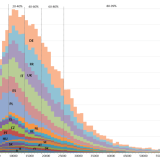
Goed functionerende en inclusieve arbeidsmarkten
Goed functionerende arbeidsmarkten zijn een vereiste om het banenscheppend potentieel van de economie optimaal te benutten, nu deze de financiële en economische crisis te boven komt. De crisis had zeer uiteenlopende gevolgen voor de arbeidsmarkten in de EU-lidstaten en bepaalde groepen, zoals jongeren en laagopgeleiden, werden bijzonder zwaar getroffen. De snelle structurele veranderingen brengen ook nieuwe uitdagingen in de vorm van mogelijke arbeidstekorten en discrepanties tussen het aanbod van en de vraag naar vaardigheden in diverse sectoren en regio’s.
Het belangrijkste instrument van de EU voor het bevorderen van werkgelegenheid en sociale inclusie is het Europees Sociaal Fonds, bedoeld om mensen aan werk te helpen, kwetsbare mensen te integreren in de samenleving en te zorgen voor billijkere kansen voor iedereen. Verder is er een breed scala aan Europese wetgeving waarin de rechten van werknemers op de arbeidsmarkt worden gereguleerd. Daarnaast heeft de Europese Commissie in april 2017 de Europese pijler van sociale rechten gelanceerd. De pijler bouwt voort op het Europees sociaal en werkgelegenheidsbeleid en vult dit aan, om het beleid aan te sturen op een aantal terreinen die van essentieel belang zijn voor goed functionerende en billijke arbeidsmarkten en welzijnsstelsels.
- Europese Commissie: Europees Sociaal Fonds
- Europese Commissie: Europese pijler van sociale rechten




























